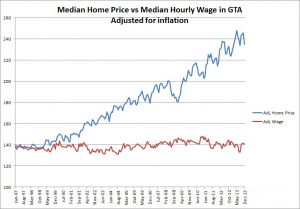A new study uses artificial intelligence to find that jobs done by highly skilled workers are the most likely to be affected by AI. AI is likely to hit hardest at a combination of leading tech hubs and older manufacturing regions. Exposed are high-skill jobs like professional, scientific and technical services, information, finance and insurance. [CITYLAB] See:
![]() As climate change, economic change and cultural change make disasters more severe, researchers say we can prepare by being informed, volunteering, and staying socially connected. The glue that provides survival and confidence even in the worst of times is not wealth or separatism, it is bonding with one another; it is sharing and caring; it is ‘having one another’s back.’ Daily life already is tumultuous but quickly financial and personal wellbeing will be challenged in ways that truly may interrupt life’s familiar traditions.
As climate change, economic change and cultural change make disasters more severe, researchers say we can prepare by being informed, volunteering, and staying socially connected. The glue that provides survival and confidence even in the worst of times is not wealth or separatism, it is bonding with one another; it is sharing and caring; it is ‘having one another’s back.’ Daily life already is tumultuous but quickly financial and personal wellbeing will be challenged in ways that truly may interrupt life’s familiar traditions.
Generally speaking, there will be many jobless families; research shows job loss will grow to half the known jobs that exist today – by as soon as 2035. Further, weather patterns are shifting to a degree that agricultural economics around the world are in peril year by year; finally, even the American political dream is at risk as a dysfunctional government lies unprepared for a vastly different and burdensome situation. By 2050 and beyond, climate change will not help as millions of people around the planet lose their homes to sea rise.
There are many things citizens can do to prepare for a perfect storm of change. Foremost, every citizen must realize immediately that identity politics is deadly. Citizens must do a 180° turn and begin relating to others in supportive ways instead of with conflicting prejudice. It is a notable sensation to look at others through a sympathetic eye instead of an eye of judgment. Togetherness will be needed to survive tension as resistant as a tug-of-war.
There is one bright spot available: the Green New Deal (GND). Almost as exactly as FDR’s tax inversion and his WPA make-work projects pulled the US out of a deadly depression, GND will generate new jobs that don’t exist today. GND covers every definition of infrastructure from new bridges to new Internet to high speed trains to a new power grid and anything else the reader can imagine that needs to be invented, upgraded or implemented. GND will take at least a decade, most likely closer to two decades.
The problem is a republican-controlled US Senate. Speaking as clinically and as intellectually as possible, mariner suggests the Republican Party is the last vestige of a government from the previous century. There is no other way to say it. If the US will be prepared to assist its citizens, it cannot become so until an overturn of the US Senate and the conservative wing of red states. The first chance for this to happen is 2020. If the Senate is not overturned, the citizens must wait, as gathering cultural and economic storms swirl about, until 2024. (2024 is only eleven years before 2035.)
Even if the US Senate is overturned, there are so many inefficiencies, abuses to citizens and economic thievery that the government itself must be reformed. Mariner has pointed this out in many past posts; visit the politics archive if the reader is interested.
It would be a mistake to sit and wait for the government to morph itself into something useful. Unlike identity politics, racism, elitism and all the other self-important isms, sympathy and empathy can stretch a long way to accommodate hardships that aren’t anyone’s fault in particular but which cannot be ignored. Mariner suggests his standby – continuously look for opportunities to pass it forward; practice makes perfect.
Tithing fits in today’s situation. Imagine if everyone put 10% of their time into good works for neighbors, strangers and the needy. If everyone practiced this way, the cost of living through these times could be reduced by $billions! The alley behind mariner’s home is gravel. A neighbor has taken it upon himself to maintain the alley in excellent condition. Two things: bite one’s tongue painfully every time one has a judgmental thought and
Pass it forward.
Ancient Mariner
.

